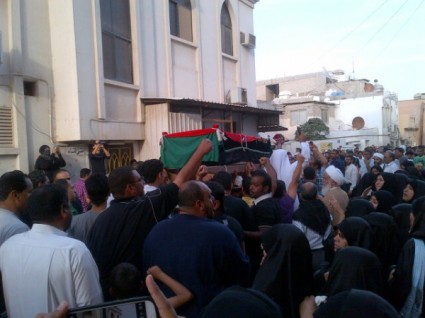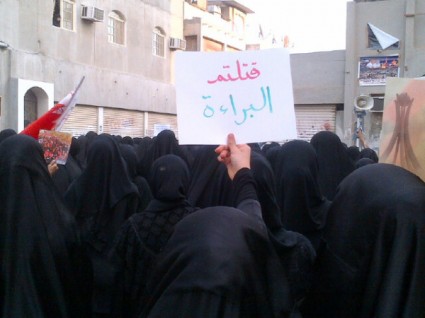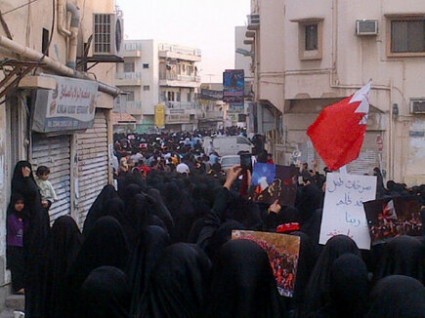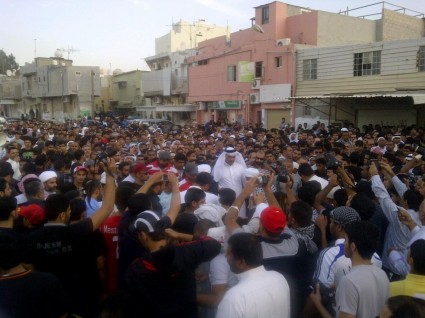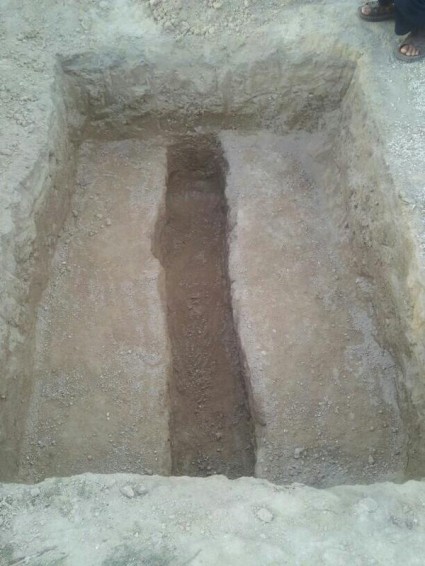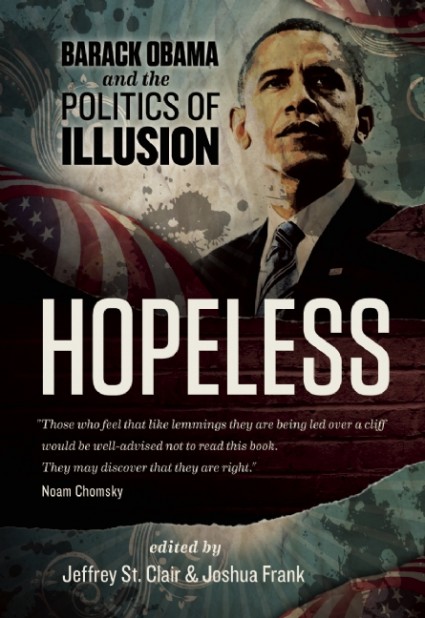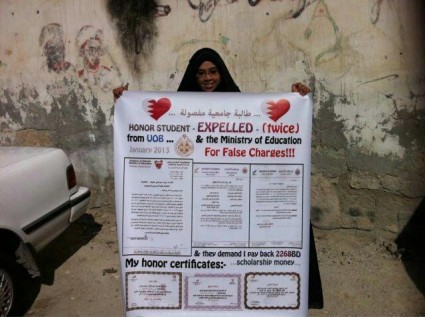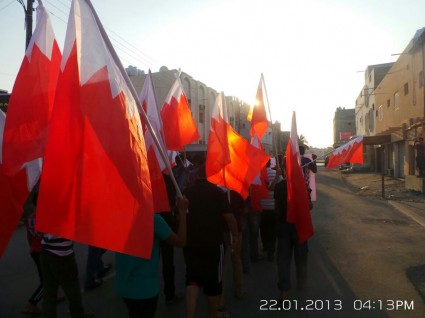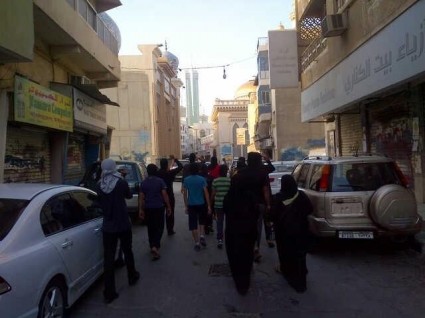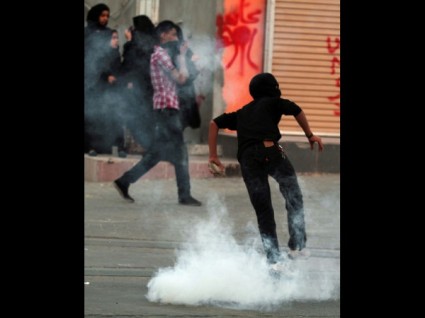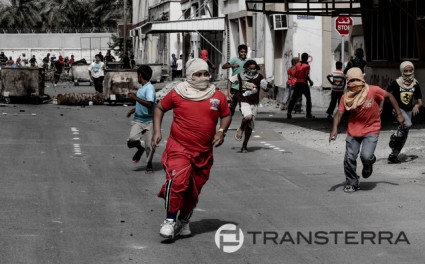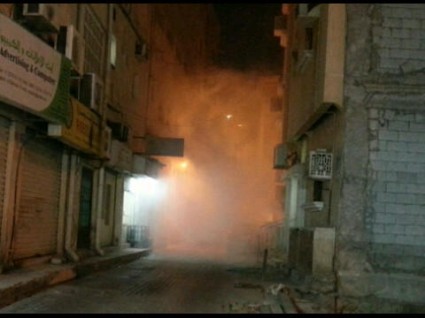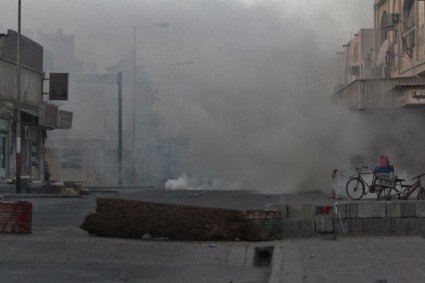Murderous Regime in Bahrain takes life of 8 yrs old Qassim Marzooq, in systematic gassing of homes by police
January 27, 2013 Add Comments
Blac Block Marches Egypt
Egyptian Anarchist Movement Emerges with Wave of Firebombings and Street Fight
24 January, 2013 – Info Shop – Ryan Harvey – Even If Your Voice Shakes
Anarchists have been present in Egypt before, during, and after the revolution, but until today, they have yet to organize a mass grouping under the banner of anarchism. The Ultras of Egypt’s football clubs have for years been associated with anarchist ideas and actions, and they are widely credited with having initiated the level militancy that brought down the Mubarak government in February of 2011.
Last night, anarchism left the graffitied walls, small conversations, and online forums of Egypt, and came to life in Cairo, declaring itself a new force in the ongoing social revolution sparked two years ago with multiple firebombings against Muslim Brotherhood offices. Later, the government shutdown the “Black Blocairo” and “Egyptian Black Bloc” Facebook pages, but they were soon re-launched.
“Wait for our next attacks as we respond to the closing of our official page…” they posted in a statement posted online this morning (translated below).
Today, the black bloc made its first mass-appearance in Tahrir Square, and, shortly after, firebombed the Shura Council (Egyptian Parliament), tore down a section of the protest-barrier walls leading from Tahrir Square, and, with others, engaged in fighting against security forces.
These statements and actions are in preparation for tomorrow’s second anniversary of the revolution, and for what some are calling “a whole new level” or protest in Egypt.
Anarchism and the black bloc concept has grown in recent months across Egypt, Stemming from various anarchist grouping/circles that coalesced during the revolutionary period. A massive distrust among the youth of all political parties, a sharp critique of the role of religion within governance, and the inspiration of anarchist resistance around the world (largely symbolized by the late-2008 revolt in Greece) have helped it catalyze. …more
January 24, 2013 Add Comments
Subcomandante Marcos: “Them and Us: The (lack of) Reason among those from Above.”
Chiapas: release of new communique by the EZLN hours before the arrival or Enrique Peña Nieto to lands under its influence
20 January, 2013 – SIPAZ
On 20 January, there was published the first part of a new message signed by Subcomandante Marcos entitled “Them and Us: The (lack of) Reason among those from Above.” The communique is written as a parody, from the perspective of those who speak “from above.” It asserts among other things that “We are those who command. We are the most powerful, although we be few in number. It does not matter to us what you do-think-hear-or say, just as long as you are deaf, mute, and stationary. We can impose a government onto somewhat intelligent people (although these are difficult to find in the political class), but we select one who cannot even pretend to know what is going on. Why? Because we can […]. We can use the police and the military apparatus to persecute and incarcerate various criminals, but these criminals are a vital part of our operations. In exchange we can choose to persecute you, beat you, arrest you, torture you, imprison you, and kill you.”
The powerful are said to affirm that “what truly is a danger, a veritable chaos, is when whoever makes herself into a collective, ground, band, race, or organization, and then come to learn how to say ‘yes’ and ‘no,’ and that these come to agreement among themselves. Because this ‘no’ has to do with those like us who command. And this ‘yes’… Well, this is a calamity; imagine that each person construct her own destiny, deciding what she will be and do. This would be like claiming that we are superfluous–that we are the ones who are left over, the ones who are not necessary, the ones who should be incarcerated, the ones who should disappear.”
It should be mentioned that the communique was released a few hours before the arrival of President Enrique Peña Nieto to Chiapas to present the National Crusade against Hunger in the Las Margaritas municipality. This crusade has as its budget close to 4 billion pesos, and it seeks to be deployed in some 400 municipalities with the highest indexes of social marginalization. Notably, Las Margaritas is one of the poorest municipalities in the country; it is considered to be a Zapatista bastion, being one of the cities that were taken peacefully by the EZLN on 21 December 2012. …more
January 24, 2013 Add Comments
Al-Dair Protest for Justice and Freedom
January 24, 2013 Add Comments
“Man is not free to watch impassively the enslavement and dishonor of men, nor their struggles for liberty and honor.” – José Martí
January 24, 2013 Add Comments
Washington theatrics – Inept Secretary of State blames ‘Arab Spring’ for “shattered security” caused by Western Neo-imperial Aggression
Hillary Clinton on Benghazi: ‘Arab Spring shattered security in region’
23 January, 2013 – UK Telegraph
Hillary Clinton said the Arab Spring “shattered” security in North Africa, pointing to instability in Mali and Algeria, as she was finally grilled on the attack on the consulate in Benghazi, Libya.
In an emotional appearance in front of the Senate Foreign Relations Committee, Mrs Clinton cast the incident, the first in which a US ambassador was killed since 1988, as part of a long history of such violence as well as the result of regional instability since the Arab Spring of popular revolutions began in 2011.
Speaking in congressional testimony delayed by more than a month because of her ill health, Mrs Clinton offered her first detailed accounting of the first days after the attack, saying she directed the US response from the State Department.
“I take responsibility,” Mrs Clinton said, echoing comments she first made in October and stressing that she has accepted all of the recommendations of an independent review panel that ultimately held lower-level officials responsible.
“Nobody is more committed to getting this right. I am determined to leave the State Department and our country safer, stronger and more secure,” she added.
She cited the recent assault on a gas complex in Algeria as an example of the “increasingly complex threats” in the region.
“Benghazi didn’t happen in a vacuum,” Mrs Clinton said at the start of the hearing. “The Arab revolutions have scrambled power dynamics and shattered security forces across the region.”
January 24, 2013 Add Comments
Barack Obama and the Polictics of Illusion
January 24, 2013 Add Comments
Some lessons from the assassination of Gaddafi and implosion of Libya
Why The US And Its Allies Wanted Gaddafi Dead And What Are The Lessons For Future?
Sako Sefiani – 23 January, 2013 – iranian.com
There were 3 major objectives the West pursued from the war on Libya:
1) to gain control of its vast oil reserves for Western companies,
2) to take control of and manipulate the democracy movement to direct it towards meeting their own strategic interests rather than the movement’s, by arming, financing, supporting and finally putting in power their own loyalists (when the regime was forecasted to fall soon, US and European officials met with their “rebels” whom they had selected among the opposition to arm and finance, to form the replacement government), and
3) to undermine and thwart Gaddafi’s efforts at unifying the African nations with anti-colonial predisposition which tended to put regional differences aside and put Africa first. This was analogous to what Chavez has done in Latin America.
Gaddafi might have been many things: narcissistic, egomaniac, dictator and maybe even as crazy and out of control as the media made him out to be, as the Pentagon was preparing for military attack on his country, but what bothered imperialist policy makers in US and their allies in Europe the most was that he refused to take orders from them or put the interests of imperialism above those of African people, and more significantly, as reported in June 14, 2012 issue of The Guardian, he tried to unite the continent to form a “United States of Africa”, with a single currency, military, and economy to stand up to colonial powers which plundered the continent for hundreds of years and left it impoverished.
And it should be noted that the proposition for unifying the continent was not from a resource-poor country trying to share in others’ resources – Libya has the largest oil reserves in Africa, which surely was not lost on imperialism. Uniting the continent, or even working and taking steps towards it, would have enormous and far reaching consequences for Africans, and especially imperialists, as it would take away the latter’s ability to divide, conquer and rule, and that had to be in the minds of Western policy makers as they pondered his faith.
The imperialists’ play book must have in big bold letters the simple lesson: “unity is bad, division is good”. This is especially pertinent in Africa where there are Arab nations in the North and non-Arab blacks in the South. This distinction came to fore after the fall of the Gaddafi regime when US-backed rebels began targeting and persecuting the nation’s blacks.
And Gaddafi was not just words when it came to developing the continent and fostering unity. As was reported in the above-mentioned issue of The Guardian, he was instrumental in creating the African Union in 2002 and was its biggest financial contributor. He also made investments in infrastructure and other projects within a variety of poor African countries to the tune of over $150 billon.
A figure such as him, regardless of what one might think of him as a person or ruler, does not fit in imperialists’ plans for dominating and plundering the continent. The US and its European allies want the continent’s vast supply of cheap labor and natural resources, most notably oil, which is possible through pro-West puppets easily manipulated into division and fighting their brethren rather than standing up to foreign corporations and their governments.
As the Guardian observed: the significance of the war on Libya was not so much in overthrowing Gaddafi, as was in eliminating “the fiercest adversary” of US plans for future military operations in the continent which we began to see shortly after his murder in the hands of pro-US “rebels”. The Guardian adds:
“It is no coincidence that within months of the fall of Tripoli – and in the same month as Gaddafi’s execution – President Obama announced the deployment of 100 US special forces to four different African countries, including Uganda” and Somalia.
“Fourteen major joint military exercises between Africom [Africa Command of US military] and African states are also due to take place this year; and a recent press release from the Africa Partnership Station – Africom’s naval training programme – explained that 2013’s operations will be moving ’away from a training-intensive program’ and into the field of ’real-world operations’. This is a far cry from the Africa of 2007, which refused to allow Africom a base on African soil”.
Thus, Gaddafi’s overthrow eliminated an adversary to imperialists’ plans in Africa and opened the continent to more military interventions for control of resources, cheap labor, markets and an opportunity for further military operations for total hegemony over the continent. …more
January 24, 2013 Add Comments
The White House Un-Reality Show
Despite the fact that “it was Barack Obama who began the current austerity offensive in the weeks before delivering his first inaugural address,” the president was allowed to pose as a champion of the social safety net. Having redefined war, he once again claims to be a peacemaker. “By cheering the inaugural speech, progressives are only encouraging Obama’s gaming and mendacity.”
The White House Un-Reality Show
by Glen Ford – 23 January, 2013 – Black Agenda Report
“He merely peppered the speech with progressive buzzwords and references – just enough notes to get the faithful to fill in the empty spaces with their own internal music.”
Like an abusive spouse who preys on the emotional desperation and dependency of his domestic victim, Barack Obama knows that all he need do is offer some cheap street corner flowers and a few sweet words, and the previous nights and months and years of beatings will be forgiven. Just hum a bar or two of an old, shared song, and the battered partner will supply a full symphony of Barry White’s Love Unlimited Orchestra – because she needs to hear it, if only inside her own head.
After four years of chasing Republican skirts in search of a grand austerity bargain; of debauching himself in marathon binges of global lawlessness and aggressive war; of defiling the Bill of Rights through preventive detention and massive domestic spying; of callous neglect of the jobs and lost wealth crisis afflicting the most loyal members of his political family; and of brazen cavorting with the vile and filthy rich, sheltering them from incarceration for crimes against the national and global economy, Barack Obama slunk home on the morning of January 21, to be smothered with kisses.
Much of what passes for the Left, and for traditional African American leadership, agreed with the New York Times’ assessment that Barack Obama’s second inaugural address represented a firm embrace of “a progressive agenda centered on equality and opportunity.” Significantly, Senate Republican leader Mitch McConnell echoed the sentiment: ”The era of liberalism is back…the speech certainly brings back memories of the Democratic Party in ages past.”
It is in the mutual interest of corporate media and rightwing Republicans to move the bar of “progressive” politics ever rightward. However, for African Americans and white progressives, it amounts to erasing their own political legacies from history.
“There is no agreement to end U.S. combat involvement in Afghanistan, and no intention of achieving one.”
Actuality, Obama embraced nothing: he merely peppered the speech with progressive buzzwords and references – just enough notes to get the faithful to fill in the empty spaces with their own internal music. It was classic Obama.
“A decade of war is now ending,” said the Second Incarnation of Obama, sounding a false “peace” note. If he was talking about Afghanistan, that’s a damnable lie. There is no agreement to end U.S. combat involvement in Afghanistan, and no intention of achieving one – only the stated goal to lower troop levels. The Pentagon is fielding contingencies to reduce U.S. troop strength to between 6,000 and 20,000. (When Obama entered office there were 30,000 U.S. troops in Afghanistan, which he raised to about 100,000 in the “surge” of 2011.) Although the administration line is that most of the remaining Americans will be “trainers,” they will include thousands of Special Forces troops to continue “counterinsurgency” and “counterterrorism” operations. Special Forces are “trainers” and “force multipliers” by U.S. military definition, “training” native troops while engaged in combat missions. U.S. air forces, drone and manned, will continue to pound targets. Obama’s nearly completed “codification” of U.S. drone policies exempts the CIA from any clear rules for “targeted-killing” drone operations in neighboring Pakistan for at least a year, to allow them to do as much damage as possible in the quest for Obama’s version of peace. …more
January 24, 2013 Add Comments
“Rights are to be taken, not requested; seized, not begged for.” – José Martí
January 24, 2013 Add Comments
Bahrain “Princess from Hell” in show trial to appease Western pressure for action against “higher-ups” enabling Human Rights abuses
Noura al Khalifa Ms al Khalifa has denied the charges against her
Bahraini princess facing multiple torture charges
23 January, 2013 – BBC
A Bahraini princess is facing charges of torturing pro-democracy activists in the Gulf island kingdom.
Noura Bint Ebrahim al-Khalifa, who serves in Bahrain’s Drugs Control Unit, is accused along with another officer of torturing three people in detention.
Hundreds of protesters were detained as Bahrain struggled to put down a popular uprising that began in February 2011.
The uprising, which began peacefully with calls for democratic reform, was crushed by the ruling al-Khalifas.
Noura al-Khalifa, 29, who denies the charges, appeared in court on Sunday and Monday to hear the allegations.
In one case, the princess is accused of torturing two doctors, Ghassan and Bassem Daif, brothers who worked at the Salmaniya medical complex.
Medical staff from the facility went to help injured protesters after security police used force to disperse thousands of people who had camped out at an iconic landmark, Pearl Roundabout, in the capital, Manama.
At least two people were killed and hundreds wounded when police attacked with batons, tear gas and birdshot.
In March and April 2011 many of the medical staff were arrested and detained. It is alleged that Ms al-Khalifa tortured the doctors at that time.
She is also accused of torturing another person, 21-year-old Ayat al-Qurmazi.
Ms al-Qurmazi was arrested in March 2011 after giving public readings of poetry she wrote that was critical of the ruling family.
She alleges she was held for nine days, blindfolded, beaten with cables and threatened with rape. She identified Ms al-Khalifa as her torturer.
‘Online threats’
Ms al Qurmazi’s lawyer Reem Khalaf told the BBC that on one occasion while she was being beaten around her head, the blindfold slipped and she saw Ms al-Khalifa.
“Noura was very angry that Ayat had seen her,” Ms Khalaf said.
Ayat al-Qurmazi told the BBC she did not regret reading her poems or taking Noura al-Khalifa to court, even though she had lost her place at college and was the target of online threats and abuse.
“I am not sorry. I only said what all Bahrainis feel and I haven’t done anything against my country. What I am doing, I am doing for my country.”
The case was adjourned to 7 February after three witnesses failed to turn up.
No-one from the Bahrain government was available to comment on the charges against Ms al-Khalifa. …more
January 24, 2013 Add Comments
Aker calls to stay the course of Revolution
January 23, 2013 Add Comments
Bahrain: The Dignity Strike
January 23, 2013 Add Comments
Bahrain Protest meets regime forces for dialogue of brutality
January 23, 2013 Add Comments
Right to Education? Not in Bahrain, Protest and go to Jail
Bahrain: One-person protest for education and employment leads to arrest
19 January, 2013 – Bahrain Center for Human Rights
The Bahrain Center for Human Rights expresses its concern over the continued restrictions placed on freedom of expression in Bahrain. In two different incidents, citizens were arrested after staging one-person protest demanding basic rights.
On 16 January 2013, Zainab Abduali Taraif (20), an honors university student, was arrested after she stood silently near the financial harbor, holding a banner with her academic results and honor certificates, to protest against her second expulsion from the University of Bahrain for what she described as “false charges”. Zainab was one of over hundred students previously expelled in 2011 following the crackdown on protests. The reinstatement of the students was one of the recommendations suggested by the Bahraini Commission of Inquiry (BICI) in November 2011, and though most of them were indeed reinstated, several were expelled again in October 2012. …more
January 23, 2013 Add Comments
Saudi Protest grow in Calls for Freedom of Political Prisoners
Saudis Stage Protest Rallies to Call for Freedom of Political Prisoners
21 January, 2013 – Amnesty International
TEHRAN (FNA)- Large crowds of people staged protest rallies across Saudi Arabia to condemn the Saudi regime’s crackdown on popular protests and call for the release of political prisoners.
Local media reports said that protests were held in a number of Saudi cities, including Riyadh, Medina, al-Dammam and Buraida.
During the rallies, protesters blasted the Saudi regime for its continued detention of citizens and activists and clampdown on protests.
The marchers chanted slogans for the release of political prisoners, and called on the international human rights groups to act for the freedom of those who have been held in prison for a long period of time without charge.
Earlier this month, Amnesty International said that a group of women protesters detained by the Saudi authorities must be released unless they are charged with an internationally recognizable crime.
At least 11 women are still believed to be in detention in the Central city of Buraida as well as in the capital Riyadh after being held at a protest in Buraida on 5 January, Amnesty International reported in January.
Saudi Arabia is witnessing daily popular protests to mark the deaths of at least 15 people in connection with protests in the country since last year.
Reports vary as to how those killed in connection with the protests lost their lives. Eyewitnesses have said that some of those who died were either not taking part in demonstrations or, if they were, posed little or no risk to the security forces.
All demonstrations are banned in Saudi Arabia, but they have been taking place in Saudi Arabia’s predominantly Shiite Muslim Eastern Province since February 2011 to protest the arrest, imprisonment and harassment of members of the Shiite community for holding collective prayer meetings, celebrating Shiite religious festivals and for breaching restrictions on building Shiite mosques and religious schools.
The demonstrations in the Eastern Province have been inspired in part by protests that swept the Middle-East and North Africa region in 2011.
The Saudi authorities have responded with repressive measures against those suspected of taking part in or supporting protests or of expressing views critical of the state.
Protesters have been held without charge and incommunicado for days or weeks at a time, and in some cases reportedly subjected to torture and other ill-treatment while in detention. …more
January 23, 2013 Add Comments
Mali paves the road for War in Algeria
A long time in the making and announced by François Hollande six months in advance, the French intervention in Mali was portrayed as an emergency decision in response to dramatic developments. This scheme aims not only at seizing Mali’s gold and uranium, but more especially at paving the way for the destabilization of Algeria.
Mali: One war can hide another
by Thierry Meyssan – Voltaire Network – 21 January, 2013
Ever since Nicolas Sarkozy with Laurent Gbagbo, Muammar al-Gaddafi and Bashar al-Assad, the Kiss of Judas has been a characteristic of French diplomacy. In the photo, President François Hollande arrives in Algiers on December 10, 2012 to embrace his counterpart Abdelaziz Bouteflika. Three weeks later, he was stoking the flames of war in Mali to set Algeria ablaze.
“Appetite comes with eating”, says the proverb. After having re-colonised the Ivory Coast and Libya, then having attempted to get a hold on Syria, France is now setting its sights on Mali in order to take Algeria from behind.
During the attack on Libya, the French and the British made wide use of the Islamists to fight the power structure in Tripoli, since the Cyrenaican separatists had no interest in overthrowing Muammar al-Gaddafi once Benghazi became independent. At the fall of the Jamahiriya, I was personally witness to the reception of the leaders of AQMI (Al Qaida in Islamist Mahgreb) by members of the National Transitional Council in the Hotel Corinthia, which had just been secured by British special forces who had come from Iraq for that purpose. It was clear that the next target for Western colonialism would be Algeria, and that AQMI would play its part, but at that time I could not see which conflict could be used to justify international intervention.
Paris has imagined a scenario in which war will enter Algeria via Mali.
Shortly before NATO’s capture of Tripoli, the French managed to bribe and return the Tuareg groups. They had the time to supply them with abundant funds and weapons, but it was already too late for them to play a role on the ground. Once the war was over, they went back to their desert.
The Tuaregs are a nomad people who live in the central Sahara and on the borders of the Sahel, which is a vast area shared between Libya and Algeria, Mali and Niger. While they have obtained the protection of the first two states, they have been ignored by the last two. As a result, since the 1960’s, they have been challenging the sovereignty of Mali and Niger on their land. Quite logically, these groups, armed by France, have decided to use their weapons to impose their demands on Mali. The MNLA (National Movement for the Liberation of Azawad) has taken control over almost all of northern Mali, where they live. However, a small group of Tuareg Islamists, Ansar Dine, which is connected to AQMI, has taken advantage of this occupation to impose sharia law in some areas.
On the 21st of March 2012, a strange coup d’Etat was perpetrated in Mali. A mysterious group called CNRDRE ( National Commitee for the Recovery of Democracy and the Restoration of the State) overthrew President Amadou Toumani Touré and declared their intention to restore Malian authority in the north of the country. This resulted in great confusion, since the putschists were incapable of explaining how their actions would improve the situation. The overthrow of the President was even stranger since a presidential election was to be held five weeks later and the outgoing President was not running for office. The CNRDRE is composed of officers who were trained in the United States. They halted the election process and handed power to one of their candidates, who happened to be the Francophile Dioncounda Traore. This sleight of hand was legalised by the CEDEAO (Economic Community of West African States), whose President is none other than Alassane Ouattara, who was placed in power in the Ivory Coast by the French army a year earlier.
The coup d’Etat exacerbated ethnic divisions in the country. Elite units of the Malian army (trained in the United States), whose commander is a Tuareg, joined the rebellion, taking with them their arms and equipment.
On the 10th of January, Ansar Dine – supported by other Islamist groups – attacked the town of Konna. It then moves out of Tuareg territory to spread Islamic law to the south of Mali. The transitional President, Dioncounda Traore, declared a state of emergency and called to France for help. Paris intervened within hours to prevent the fall of the capital, Bamako. Far-sightedly, the Elysée had already pre-positioned in Mali troops from the 1st Marine Infantry Parachute Regiment (“the Colonials”) and the 13th Parachute Dragoon Regiment, helicopters from the COS (Special Operations Command), three Mirage 2000D’s, two Mirage F-1’s, three C135’s, a C130 Hercules and a C160 Transall.
In reality, it is highly unlikely that Ansar Dine represented any real threat, since the true combative forces are not Islamists, but Tuareg nationalists, who have no ambitions in the south of Mali.
In order to carry out its military intervention, France has turned to a number of countries for support, including Algeria. Alger is trapped – it either has to accept collaboration with an old colonial power, or take the risk of an influx of Islamists on its territory. After some hesitation, it agreed to open its airspace to French aviation. But then a non-identified Islamist group attacked a British Petroleum gas terminal in southern Algeria, accusing Algiers of complicity with Paris in the Malian affair. A hundred people were taken hostage, but they were not only Algerian and French. The aim of this attack is clearly to internationalize the conflict by transporting it to Algeria. …more
January 23, 2013 Add Comments
Revolution’s Morning in Bahrain
January 23, 2013 Add Comments
Mali: Neo-imperial occupation spreads across MENA in theft of mineral wealth
France war in Mali: Neo-imperialist grab dressed up in “war on terror” rhetoric
23 January, 2013 – By Finian Cunningham – PressTV
The conclusion is clear, France needed a pretext to go into Mali for several self-serving geopolitical reasons, including asserting political control over its client regime in Bamako with all the strategic resource advantages that that control entails. To achieve this, the French needed to militarise the political situation in Mali by sabotaging ongoing negotiations between the conflicting internal parties and to brand the country as an international security threat from “Islamic extremists.””
France’s intervention in Mali is simply this: a neo-imperialist power grab dressed up in “war on terror” rhetoric.
Since the old colonial power began bombing the West African country on 11 January, the Paris government has wrapped its actions up with chivalrous language of saving the region, Europe and indeed the world from “Islamic extremism”. France, we are led to believe, was “forced to act” on behalf of the beleaguered Francophile regime in Mali’s southern capital, Bamako, to save it from falling into the hands of “Islamists” allegedly “linked to Al Qaeda”.
But closer examination of background events shows that France sabotaged low-key attempts that were under way to find a political solution in Mali between the French-backed regime in Bamako and the northern separatist rebels. These talks and a ceasefire had opened only weeks before the French military intervention. The collapse of those negotiations paved the way for France to militarize the country – a step that now runs the risk of plunging the impoverished West African territory into years of internecine war. The cynical agenda is to create another failed state that will be more tightly under the political control of France, giving the French government a pretext to return to its former colony and the wider Francophone region.
Earlier this week, French Defense Minister Jean-Yves Le Drian let the cat out of the bag when he said that the aim was the “total re-conquest” of Mali.
Also, President Francois Hollande, in reply to questions about France’s role in Mali, played the “terror card.” He said, “I am often asked, ‘how long will this take?’ I answer, because it is the sole truth I know, ‘as long as necessary; the necessary time to defeat terrorism in that part of Africa.’”
Yet only days before this, the French were saying that their military operations would be over “in a matter of weeks.” Now, it seems, France is carving out a long-term role for itself in Mali. “We will leave no pockets of resistance,” says Le Drian. That sounds like a self-styled mandate for permanent presence.
This is a re-run of the American-led intervention in Afghanistan, where the “threat of Islamic extremism” has provided the moral, political and legal cover for NATO military occupation. That occupation is nothing but a criminal enterprise to give Western powers a foothold in the geo-strategic region of Central Asia. Likewise, the same agenda applies in West Africa. The Western puppet regime of President Hamid Karzai in Kabul is playing the same role as President Dioncounda Traore in Bamako. It is giving the Western powers, in this case France, a seeming mandate to wage war in a sovereign country, a war that would otherwise and rightly be seen as an imperialist act of aggression and illegal occupation. Note, that the other West African states are also backing France’s military involvement in Mali. But given their status as French client states, whose elite rulers are dependent on French patronage, their endorsement is more a sign of self-preservation than genuine concern for the people of Mali. …more
January 23, 2013 Add Comments
Commander and Chief, Barack Obama, Shamefully Militarizes the Legacy of Martin Luther King Jr.
A repellent piece of propaganda appropriates the words and images of this nonviolence advocate to glorify US militarism
US military says Martin Luther King would be proud of its weapons
22 January, 2013 – Glenn Greenwald – guardian.co.uk
Yesterday, I highlighted the extraordinary anti-war speech Martin Luther King gave in 1967, in which he said, among other things, that the US government is “the greatest purveyor of violence in the world today” and the leading exponent of “the deadly Western arrogance that has poisoned the international atmosphere for so long.” The speech was devoted to arguing that America’s militarism and war-fighting were degrading the soul of the nation and the citizenry and – for financial, political and cultural reasons – were making domestic progress impossible.
The US Air Force’s Global Strike Command yesterday posted a truly vile bit of propaganda in which it appropriates King’s image, name and words in order to claim that he would “be proud to see our Global Strike team . . . standing side-by-side ensuring the most powerful weapons in the US arsenal remain the credible bedrock of our national defense” (ellipses in original):
“The Department of Defense is a leader in equal opportunity for all patriots seeking to serve this great nation. . . The vigilant warriors in AFGSC understand they are all equal and unified in purpose to provide a safe, secure and effective deterrent force for the United States. . . .
“Dr. King would be proud to see our Global Strike team – comprised of Airmen, civilians and contractors from every race, creed, background and religion – standing side-by-side ensuring the most powerful weapons in the US arsenal remain the credible bedrock of our national defense. . . Our team must overlook our differences to ensure perfection as we maintain and operate our weapon systems. . . Maintaining our commitment to our Global Strike team, our families and our nation is a fitting tribute to Dr. King as we celebrate his legacy.”
The US military – which is currently bombing Afghanistan, Pakistan, and Yemen at least, all in secret – just exploited one of the 20th Century’s greatest proponents of nonviolence and most vehement opponents of US militarism as a public face for its aggression and violence in the world. While King may have preferred to see an integrated military rather than one divided by racial strife, his condemnations of US militarism were particularly harsh when it came to the way the US military taught American citizens to embrace a culture of violence (“I knew that I could never again raise my voice against the violence of the oppressed in the ghettos without having first spoken clearly to the greatest purveyor of violence in the world today – my own government”).
The self-described mission of the Global Strike Command is to “develop and provide combat-ready forces for nuclear deterrence and global strike operations”. The US military is actually publicly claiming that the 1964 Nobel Peace Prize winner and steadfast critic of US imperialism would be an admirer of its massive stockpile of nuclear weapons, its global assassination programs, and its covert use of violence in multiple countries around the world, including where no wars are declared (in fairness, though, its Commander in Chief is himself a winner of the Nobel Peace Prize). Merely to describe this agitprop is to illustrate its repulsiveness. …more
January 23, 2013 Add Comments
Dozens of Shias deported from UAE
Dozens of Shias deported from UAE
20 January, 2013 – by shiapost
At least 30 Shia Muslims have been deported from United Arab Emirates and forced to leave everything behind, The Shia Post reported.
The Shia immigrants were told to leave the UAE as soon as possible within 24 hours, even some of them were living since 20 years.
On of the Pakistani immigrant was given 12 hours to evacuate all his business and residential property from Dubai.
The deported imigrants are including Pakistain, Iraqi, Syrian and Lebanese Shia Muslims.
The United Arab Emirates has expelled long-term Lebanese Shiite residents from the country over their presumed affiliation with Hezbollah.
On security grounds all these were force to evacuate their property within hours, one of the immigrant informed the Shia Post.
The residence permits were also cancelled for no apparent reason.
Last year Khoja Shia madrassa closed down, Shia mosque activities restricted, World Federation meeting on 19th May 2012 shifted to Dar al Salam after government refusal to host it in Dubai.
Since 2009 hundreds of Shia have been deported from UAE, while in April 2012 in a wave of deportations of Lebanese nationals 9 immigrants were deported and banned to enter in UAE.
“I lost my huge amount of my property, above all education of my children has been disturbed”, an immigrant to the Shia Post.
The current deportation of Shia Muslims this year have also made them banned to enter in UAE due to security concerns.
They have not committed any crime and they were not in the habit of discussing politics, but they were practical Shias. …more
January 22, 2013 Add Comments
Bahrain Photojournalist Ahmed Humaidan Psychologically Tortured Denied Access Lawyer
Bahrain: Renowned Photojournalist Ahmed Humaidan Psychologically Tortured During Interrogation and Denied Access to His Lawyer
19 January, 2013 – Bahrain Center for Human Rights
The Bahrain Center for Human Rights expresses its grave concern over the escalated use of torture against journalists by the authorities in Bahrain. The BCHR received concerning reports on the well-being of Ahmed Humaidan (25 years old) who was kidnapped by fifteen security officers, in civilian clothing, on the 29th of December, 2012.
Humaidan’s family stated that Ahmed was subjected to psychological torture, which is believed to have caused him to mentally break-down. According to his family, Humaidan was forced to stand up for hours while being handcuffed and blindfolded in a very cold room. He informed his family that while he was blindfolded and handcuffed at the CID “Criminal Investigation Department” they forced him to hold an unknown object and interrogators told him that its was a timed bomb set to explode. The unknown object was in his hands for hours. He was constantly monitored during this time, and was screamed at if he moved so much as a finger.
Furthermore, Humaidan informed his family that while being interrogated and forced to confess to a crime that he claims he did not commit, interrogators threatened that they will accuse his brothers of crimes if he did not confess. The interrogators named his brothers and randomly selected charges that they would arbitrarily bring against them.
The BICI report from November 2011 documented similar death threats and psychological torture were widely employed during interrogation sessions. This is a clear indication that the authorities have failed to reform their methods of interrogation. Another example of such psychological torture documented in the BICI report states that:
“On 8 May, the detainee went to court and was cursed and sexually harassed in the car on the way there. He was taken to the side of the court for “executions”. A guard told him, “It is a long time since we executed anyone.” …more
January 22, 2013 Add Comments
UK begins Parliamentary Inquiry into UK Policy with Bahrain and Saudi
UK Parliamentary Inquiry into UK Policy with Bahrain and Saudi gets under way
22 January, 2013 – Bahrain Justice and Development Movement
The first hearing session of the UK Parliament Foreign Affairs Committee Inquiry into British policy with Saudi Arabia took place today with evidence from two former ambassadors to Bahrain. Robin Lamb, Ambassador 2003-2006 and Sir Roger Tomkys, Ambassador 1981-1984, gave evidence along side Jane Kinninmont from Chatham House and Dr. Neil Patrick from the Royal United Services Institute.
The committee itself consists of 11 members from the 3 major political parties, with all but one attending the hearing. Those present included Sir. Menzies Campbell MP, former Leader of the Liberal Democrats, Ann Clwyd MP who has been a long standing supporter of reform in Bahrain, Rory Stewart MP an expert in middle eastern affairs and others.
The inquiry, announced in October 2012, is mandated to study British policy with regards to the two Gulf States, whether its interests are being met and more generally what kind of a role it is playing. At the start of the hearing the Chair of the Committee, Richard Ottaway MP, outlined that this was not an inquiry into human rights abuses in these countries but very specifically UK policy.
With that in mind the first two individuals to answer questions were Ms. Kinninmont and Dr. Patrick, to look at UK’s role in the Gulf more generally, as well as specific to Saudi Arabia and Bahrain with Ms. Kinninmont focusing more on Bahrain whilst Dr. Patrick answered predominantly on Saudi.
In their opening remarks both highlighted the complexities of British policy in the Gulf in balancing interests, moral values and security concerns. Ms Kinninmont argued it is a difficult time for UK diplomats, but also a time of “heightened sensitivities amongst Gulf rulers”, citing the examples of many who have been imprisoned for criticizing monarchs.
She said that Britain is not doing itself any favours if it pretends that all is fine in the Gulf and there are no pressures from below for change. Ms. Kinninmont mentioned the recent speech of the Crown Prince at the Manama Dialogue in which he chose to thank Britain over the US that UK is indeed Bahrain’s closest ally. She said that Britain was prepared to be critical of Bahrain during the first days of the crackdown in February and March 2011, but has since maintained the same level of strong relations, describing this as “puzzling” since the crackdown has continued since then. ….more
January 22, 2013 Add Comments
Bahrain regime affirms its position regarding talks with Al-Wefaq Society Leaders
January 22, 2013 Add Comments
Revolution in the Kingdom of Saud
Revolution in the Kingdom of Saudi Arabia?
20 January, 2013 – The Daily Beast
The overthrow of the Saudi royals is finally a possibility. In an excerpt from a new Brookings Institution briefing book for Obama’s second term, Bruce Riedel on what a catastrophe it would be for Obama.
Saudi Arabia is the world’s last absolute monarchy. Like Louis XIV, King Abdullah has complete authority to do as he likes. But while a revolution in Saudi Arabia is still not likely, the Arab Awakening has made one possible for the first time, and it could come in President Obama’s second term.
Revolutionary change in the kingdom would be a disaster for American interests across the board. Saudi Arabia is America’s oldest ally in the Middle East, a partnership that dates to 1945. The United States has no serious option for heading off a revolution if it is coming; we are already too deeply wedded to the kingdom. Obama should ensure the best possible intelligence is available to see a crisis coming and then try to ride the storm.
Click to learn more…
Still , the kingdom of Saudi Arabia is a proven survivor. Two earlier Saudi kingdoms were defeated by the Ottoman Empire and eradicated. The Sauds came back. They survived a wave of revolutions against Arab monarchies in the 1950s and 1960s. A jihadist coup attempt in 1979 seized the Grand Mosque in Mecca but was crushed. Osama bin Laden and al Qaeda staged a four-year insurrection to topple the Sauds and failed less than a decade ago. Saudi al Qaeda cadres remain in the kingdom and next door in Yemen.
Today the Arab Awakening presents the kingdom with its most severe test to date. The same demographic challenges that prompted revolution in Egypt and Yemen, a very young population and very high underemployment, apply in Saudi Arabia. Extreme gender discrimination, long-standing regional differences, and a restive Shia minority add to the explosive potential. In recognition of their vulnerability, the Saudi royals have spent more than $130 billion since the Arab Awakening began to try to buy off dissent at home. They have made cosmetic reforms to let women sit in a powerless consulting council.
Abroad they have sent tanks and troops across the King Fahd Causeway to stifle revolution in Bahrain, brokered a political deal in Yemen to replace Ali Abdullah Salih with his deputy, and sought closer unity among the six Gulf Cooperation Council monarchies. They also have invited Jordan and Morocco to join the kings’ club. But they are pragmatists too and have backed revolutions in Libya and Syria that fight old enemies of the kingdom.
The Saudis fear, probably rightly, that real power sharing is impossible in an absolutist state. But we should plan very quietly for the worst.
If an awakening takes place in Saudi Arabia, it will probably look a lot like the revolutions in the other Arab states. Already demonstrations, peaceful and violent, have wracked the oil rich Eastern Province for more than a year. These are Shia protests and thus atypical of the rest of the kingdom. Shia dissidents in ARAMCO, the Saudi oil company, also have used cyberwarfare to attack its computer systems, crashing more than 30,000 work stations this August. They probably received Iranian help.
Much more disturbing to the royals would be protests in Sunni parts of the kingdom. These might start in the so-called Quran Belt north of the capital, where dissent is endemic, or in the poor Asir province on the Yemeni border. Once they begin, they could snowball and reach the major cities of the Hejaz, including Jeddah, Mecca, Taif, and Medina. The Saudi opposition has a vibrant information technology component that could ensure rapid communication of dissent within the kingdom and to the outside world.
The critical defender of the regime would be the National Guard. Abdullah has spent his life building this Praetorian elite force. The United States has trained and equipped it with tens of billions in helicopters and armored vehicles. But the key unknown is whether the Guard will shoot on its brothers and sisters in the street. It may fragment or it may simply refuse to suppress dissent if it is largely peaceful, especially at the start.
The succession issue adds another layer of complication. Every succession in the kingdom since its founder, Abdel Aziz bin Saud, died in 1953 has been to his brothers. King Abdullah and Crown Prince Salman are the end of the brood; only a couple of possible remaining half brothers are suitable. Both the king and crown prince are ill, and both are often unfit for duty. If Abdullah and/or Salman die as unrest begins—a real possibility—and a succession crisis ensues, then the kingdom could be even more vulnerable to revolution. …more
January 22, 2013 Add Comments


